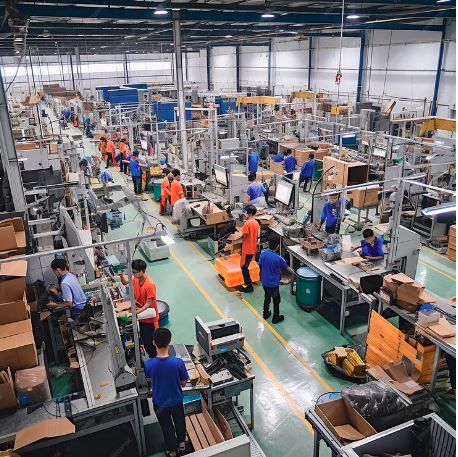Picture this: you’re running a biotech company, pouring your heart and soul into developing a groundbreaking therapy. Years of research, sleepless nights, and countless experiments have led to this moment. But then, a regulatory inspector walks through your facility and points out a tiny oversight in your manufacturing process. Suddenly, your dream is on hold. That’s where GMP certification comes in—a lifeline that ensures your products meet the highest standards of quality and safety. But what exactly is GMP certification, and why should it be on every biotech company’s radar? Let’s break it down.
Good Manufacturing Practice, or GMP, is more than just a fancy acronym. It’s a set of guidelines that ensures products are consistently produced and controlled according to strict quality standards. You know what? When your processes are GMP-certified, you’re telling the world, “We’ve got this under control.”
What’s the Big Deal About GMP Certification?
At its core, GMP certification is about quality assurance. It’s a framework that covers everything from how you handle raw materials to how you train your staff. Think of it like a recipe for your favorite dish—except instead of spices and ingredients, you’re mixing precision, consistency, and safety. The goal? To ensure that every batch of your product, whether it’s a life-saving drug or a cutting-edge biologic, is safe and effective.
Why does this matter so much for biotech companies? Well, the stakes are sky-high. A single misstep in manufacturing could lead to contaminated products, ineffective treatments, or worse, harm to patients. GMP certification helps you avoid those nightmares by setting clear standards for:
- Facility cleanliness: No dust bunnies or rogue bacteria allowed.
- Equipment maintenance: Your machines need to be as reliable as your morning coffee.
- Staff training: Everyone needs to know their role like the back of their hand.
- Documentation: If it’s not written down, it didn’t happen.
Here’s the thing: GMP certification isn’t just about avoiding disasters. It’s also about proving to regulators, investors, and partners that your company is serious about quality. In a field as competitive as biotech, that’s a game-changer.
The Journey to GMP Certification: Not a Walk in the Park
Let’s be real—getting GMP certification isn’t something you knock out over a weekend. It’s a rigorous process that demands time, effort, and a whole lot of attention to detail. But don’t let that scare you. Think of it like training for a marathon: tough, but worth it when you cross the finish line.
The process typically starts with a gap analysis. This is where you take a hard look at your current operations and compare them to GMP standards. Are your cleanrooms up to snuff? Is your documentation airtight? Are your staff trained to handle unexpected curveballs? This step is like holding a mirror up to your operations—it shows you exactly where you need to improve.
Why Biotech Companies Can’t Skip GMP Certification
If you’re wondering whether GMP certification is optional, let me clear that up: it’s not. Regulators like the FDA and EMA require GMP compliance for any company manufacturing drugs, biologics, or medical devices. Without it, you’re not getting your product to market. Period.
But it’s not just about satisfying regulators. GMP certification also protects your company from costly mistakes. Imagine spending millions on a clinical trial only to have your product rejected because of a manufacturing issue. That’s the kind of headache that keeps CEOs up at night. GMP certification helps you avoid those pitfalls by ensuring every step of your manufacturing process is rock-solid.
The Human Side of GMP Certification
Here’s where it gets personal. Behind every GMP-certified product is a team of people working tirelessly to get it right. From the lab techs who double-check every measurement to the quality assurance folks who live and breathe SOPs, GMP certification is a team effort. And when you get it right, there’s a sense of pride that comes with knowing you’re making a difference.
I remember talking to a biotech scientist who described the moment her company earned GMP certification. “It was like we’d all climbed a mountain together,” she said. “We knew our work was going to help people, and that felt incredible.” That’s the kind of emotional payoff that GMP certification brings—not just to your company, but to the people who make it happen.
Common Missteps and How to Avoid Them
Even the best companies can stumble on their way to GMP certification. One common mistake is underestimating the importance of documentation. You might have the cleanest facility in the world, but if your records are a mess, auditors will send you packing. My advice? Treat documentation like your company’s diary—every detail matters.
Another pitfall is assuming your existing processes are “good enough.” Spoiler alert: they probably aren’t. GMP standards are strict for a reason, and cutting corners isn’t an option. Take the time to review every step of your manufacturing process, from raw material storage to final product testing. It’s tedious, but it’s worth it.
And here’s a big one: don’t skimp on training. Your staff are the backbone of your operation, and they need to be well-versed in GMP principles. Regular training sessions, mock audits, and clear communication can make all the difference. After all, a well-prepared team is your best defense against surprises during an audit.
The Ripple Effect of GMP Certification
Here’s something you might not think about: GMP certification doesn’t just impact your manufacturing process—it can transform your entire company. When you commit to GMP standards, you’re fostering a culture of excellence. Employees take pride in their work. Processes become more efficient. Even your investors start to see you as a safer bet.
Plus, GMP certification can open doors to new markets. Many countries require GMP compliance for imported drugs and biologics. Without it, you’re stuck on the sidelines while your competitors expand globally. With GMP certification, you’re ready to play on the world stage.
Staying GMP-Compliant: It’s Not a One-and-Done
Here’s a reality check: earning GMP certification is just the beginning. Staying compliant is an ongoing commitment. Regulators don’t just check in once and call it a day—they’ll be back, and they’ll expect you to maintain those high standards. That means regular internal audits, continuous training, and a willingness to adapt as regulations evolve.
It’s a bit like tending a garden. You can’t just plant the seeds and walk away—you’ve got to water, prune, and nurture it. GMP certification requires the same kind of care. But when you get it right, the rewards are worth it: a smoother path to market, fewer regulatory hiccups, and a reputation for quality that stands the test of time.
A Few Tips to Make GMP Certification Less Stressful
If you’re starting the GMP certification journey, here are a few pointers to keep you sane:
- Start early: Don’t wait until you’re ready to launch your product. Begin aligning with GMP standards from day one.
- Get expert help: Consultants who specialize in GMP can guide you through the process and save you from costly mistakes.
- Embrace technology: Tools like electronic quality management systems (eQMS) can streamline documentation and compliance.
- Build a quality culture: Make GMP principles part of your company’s DNA, not just a checklist.
These steps won’t make the process effortless, but they’ll make it manageable. And trust me, when you see that GMP certification stamp, it’ll feel like a victory worth celebrating.
The Bigger Picture: Why GMP Certification Is Worth It
At the end of the day, GMP certification is about more than just following rules. It’s about building a company that stands for quality, safety, and trust. It’s about knowing that the products you create will make a difference in people’s lives—without compromising on integrity. In the fast-paced, high-stakes world of biotech and life sciences, that’s no small feat.
So, if you’re on the fence about pursuing GMP certification, let me leave you with this: it’s not just a requirement; it’s an opportunity. An opportunity to refine your processes, inspire your team, and make your mark in an industry that’s changing the world. Are you ready to take that step?


